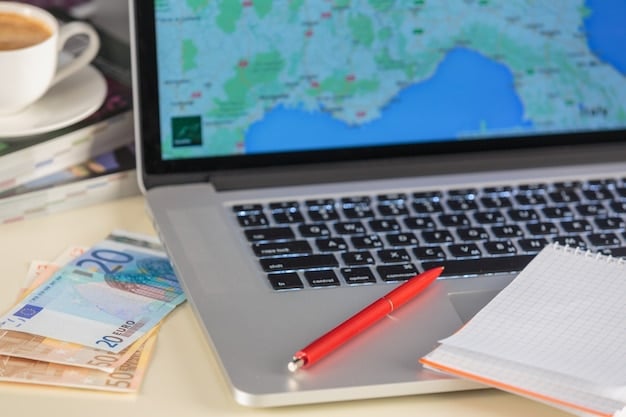Financial Planning for US Digital Nomads: Investing & Saving

Anúncios
Financial planning for US digital nomads involves unique strategies for investing, saving, and managing finances while navigating location independence, international taxes, and varying income streams.
Are you a US digital nomad dreaming of financial freedom while exploring the world? Mastering **financial planning for US digital nomads** is crucial for securing your future and enjoying your adventures worry-free. Let’s dive into essential strategies for investing and saving!
Anúncios
Understanding the Unique Financial Landscape for US Digital Nomads
The life of a digital nomad comes with incredible freedom and flexibility, but it also presents unique financial challenges. Unlike traditional employees, digital nomads often face fluctuating income, complex tax situations, and the need to plan for retirement independently. Understanding these challenges is the first step toward building a secure financial future.
Income Volatility and Budgeting
One of the biggest hurdles for digital nomads is managing income volatility. Freelance work and remote contracts often come with unpredictable paychecks, making it essential to budget effectively and build a financial cushion.
Anúncios
- Track Your Income and Expenses: Use budgeting apps or spreadsheets to monitor your income and expenses closely.
- Create a Realistic Budget: Identify your essential expenses and allocate funds accordingly, allowing for some flexibility.
- Build an Emergency Fund: Aim to save at least 3-6 months’ worth of living expenses in a readily accessible account.
Navigating Taxes as a US Digital Nomad
US citizens and permanent residents are taxed on their worldwide income, regardless of where they live. This means that as a digital nomad, you’ll need to understand US tax laws as well as the tax implications of living and working abroad. It’s advisable to consult a tax professional who specializes in expatriate taxes.
Understanding these unique aspects of financial life as a digital nomad sets the stage for creating a robust plan tailored to overcome any challenges.

Investing Strategies for Location-Independent Professionals
Successful investing is vital for all individuals, but it takes on a special importance for digital nomads. With no employer-sponsored retirement plans and the necessity of generating income from investments, it’s important to develop a solid strategy.
Retirement Accounts for the Self-Employed
Digital nomads, often categorized as self-employed, have several retirement account options available that can help reduce their tax liability. Consider these options for long-term financial security.
- SEP IRA: A Simplified Employee Pension (SEP) IRA allows you to contribute up to 20% of your net self-employment income, which grows tax-deferred until retirement.
- Solo 401(k): A Solo 401(k) allows you to contribute as both the employee and the employer, potentially leading to higher contribution limits than a SEP IRA.
- SIMPLE IRA: A Savings Incentive Match Plan for Employees (SIMPLE) IRA is another option, with slightly lower contribution limits but simpler administrative requirements.
Diversifying Your Investment Portfolio
Diversification is key to mitigating risk in your investment portfolio. As a digital nomad, it’s important to spread your investments across different asset classes, industries, and geographic regions. Consider these options:
- Stocks and Bonds: Allocate a portion of your portfolio to stocks for growth potential and bonds for stability.
- Real Estate: Consider investing in rental properties or REITs (Real Estate Investment Trusts) for passive income.
- International Investments: Diversify your portfolio by investing in international stocks and bonds to gain exposure to different economies.
A well-diversified portfolio will give you a hedge against market volatility while targeting strong growth over the long term. Stay the course and regularly rebalance as needed.
Saving Money While Traveling the World
One of the joys of being a digital nomad is the ability to live and work from anywhere. However, travel expenses can quickly add up. Implementing smart saving strategies is essential to make your income stretch further while still enjoying your adventures.
Accommodation and Transportation Savings
The two biggest expenses for most travelers are lodging and transportation. There are many ways to reduce these costs without sacrificing comfort or convenience.
- House Sitting: Offer to care for someone’s home and pets while they’re away in exchange for free accommodation.
- Long-Term Rentals: Negotiate discounts for longer stays in apartments or guesthouses.
- Travel Hacking: Utilize credit card rewards and airline miles to get free or discounted flights and accommodations.
Everyday Expense Management
Small daily expenses can take a bigger toll than you expect. Mindful spending habits are key to ensuring you are not burning through your finances.
- Cook Your Own Meals: Eating out can be expensive. Prepare your own meals whenever possible to save money on food.
- Utilize Free Activities: Take advantage of free activities like hiking, exploring parks, and attending local events.
- Negotiate Prices: Bargain for goods and services, especially in countries where it’s culturally acceptable.
Remember to assess where you can spend less without sacrificing your overall happiness and well-being.
Managing International Bank Accounts and Currency Exchange
Dealing with multiple currencies and international bank transfers can be complex for digital nomads. Opening international bank accounts and using efficient currency exchange methods can help streamline your finances.
Opening International Bank Accounts
Having local bank accounts in the countries you frequent can simplify transactions and reduce foreign transaction fees. Consider these options:
Wise and Other Fintech Solutions
Companies like Wise (formerly TransferWise) and similar fintech platforms offer convenient and cost-effective ways to manage money across borders. These services typically have lower fees and better exchange rates compared to traditional banks.
Choosing the right money-management tool can save you a significant amount of money in transaction fees, making it a wise move for every nomad.

Health Insurance and Emergency Planning for Travelers
Health insurance and emergency planning are critical aspects of financial planning for digital nomads. Unexpected medical expenses or emergencies can quickly derail your financial stability. Having a solid plan in place can provide peace of mind and protect your finances.
Choosing the Right Health Insurance
Standard health insurance may not cover you when you’re traveling internationally. Consider these options for comprehensive coverage:
- Travel Insurance: Travel insurance can cover medical expenses, trip cancellations, and lost or stolen belongings.
- International Health Insurance: International health insurance provides more comprehensive coverage for long-term stays abroad.
- Expat Health Insurance: Expat health insurance is designed for individuals living abroad for extended periods and offers global coverage.
Creating an Emergency Plan
In addition to health insurance, it’s important to have an emergency plan in place. This includes:
- Emergency Fund: Maintain an emergency fund specifically for unexpected travel-related expenses.
- Important Documents: Keep copies of your passport, insurance information, and other important documents in a secure location.
- Emergency Contacts: Share your travel itinerary with family or friends and provide them with emergency contact information.
A well-prepared plan will ensure you can tackle unforeseen challenges with confidence, safeguarding your financial health.
Long-Term Financial Goals: Retirement and Beyond
As a digital nomad, thinking about retirement might seem distant, but it’s essential to start planning early. Establishing long-term financial goals and implementing strategies to achieve them are crucial for securing your future.
Setting Retirement Goals
Determine how much you’ll need to retire comfortably and set realistic savings goals. Consider factors such as your desired lifestyle, anticipated expenses, and potential sources of income.
Estate Planning Basics
Creating a will and other estate planning documents can ensure that your assets are distributed according to your wishes in the event of your death. It’s advisable to consult an estate planning attorney to create a customized plan.
With a long-term vision and proactive measures, you can ensure a comfortable financial future while enjoying your nomadic lifestyle today.
| Key Point | Brief Description |
|---|---|
| ✈️ Tax Planning | Understand US tax obligations and international tax treaties. |
| 💼 Retirement Savings | Utilize SEP IRAs or Solo 401(k)s for tax-advantaged savings. |
| 🛡️ Health Coverage | Secure international health insurance for medical emergencies. |
| 💰 Budgeting | Track income and expenses to manage finances effectively. |
Frequently Asked Questions
▼
Effective budgeting, tracking your income and expenses, and building an emergency fund are crucial for managing income volatility. Having at least 3-6 months of living expenses saved can provide a financial cushion.
▼
US citizens and permanent residents are taxed on their worldwide income. You need to report all income earned, regardless of where you live. Consulting with a tax professional specializing in expatriate taxes is advisable.
▼
Options include SEP IRAs, Solo 401(k)s, and SIMPLE IRAs. Each has different contribution limits and administrative requirements, so consider which best fits your financial situation.
▼
Consider house sitting, look for long-term rental discounts, and utilize travel hacking techniques such as credit card rewards and airline miles to reduce accommodation costs.
▼
Standard health insurance may not suffice internationally. Options include travel insurance, international health insurance, and expat health insurance, depending on how long you plan to stay abroad.
Conclusion
Mastering **financial planning for US digital nomads** is essential for achieving financial freedom and enjoying your location-independent lifestyle. By understanding the unique challenges, implementing robust investing strategies, saving money while traveling, and planning for long-term security, you can confidently pursue your dreams of exploring the world while securing your financial future.





